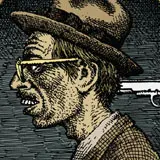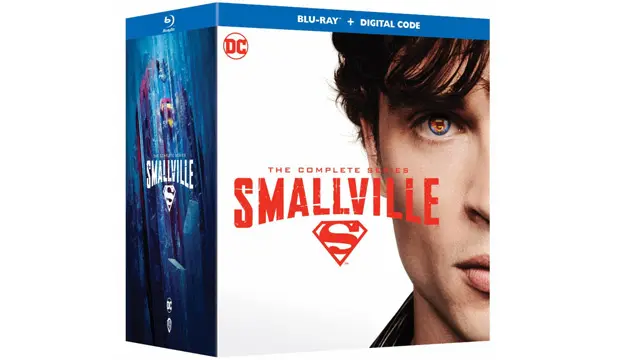 While you may not recognize Robert Crumb by name, if you’re in tune with late 20th century popular culture, his artwork will jar your memory. Most famous for the ‘Keep on Truckin’ logo and ‘Fritz the Cat,’ his autobiographical cartoons are both a labor of love and therapy for working through psychological issues. Or more precisely keeping them at bay, since the artist’s demons are sublimated into his work without exorcising them. Mixing trenchant social criticism (such as the moral hypocrisy of the nuclear family or veiled racist attitudes) with aberrant sexuality, Crumb’s comics remain a highlight of fringe culture.
While you may not recognize Robert Crumb by name, if you’re in tune with late 20th century popular culture, his artwork will jar your memory. Most famous for the ‘Keep on Truckin’ logo and ‘Fritz the Cat,’ his autobiographical cartoons are both a labor of love and therapy for working through psychological issues. Or more precisely keeping them at bay, since the artist’s demons are sublimated into his work without exorcising them. Mixing trenchant social criticism (such as the moral hypocrisy of the nuclear family or veiled racist attitudes) with aberrant sexuality, Crumb’s comics remain a highlight of fringe culture.
Terry Zwigoff’s (Ghost World, Bad Santa) Crumb (1995) achieves everything one could hope from a documentary about an eccentric cartoonist. Being friends with the artist for over two decades before the film’s release, the director creates an intimate portrayal of a man out of sync with modern society. Obviously an edited affair, this documentary comes across as very frank and unscripted.
Crumb, his family/friends and critics, both positive and negative, are forthcoming about taboo subjects including abnormal sexual proclivities, racism and negative attitudes towards women, all the while relating these themes to copious examples of his artwork (coupled with fascinating instances of Robert’s inspired drawing technique). Crumb contains a strange, intriguing and sometimes sad group of folks to spend two hours visiting but is never sensationalist, often brutally honest in its criticism and all the while an absorbing watch showcasing one man’s uncompromising love of artistic expression.
High-Def Presentation
I initially wanted to make apologies for the 16mm source which Criterion’s BD has to work with, but this high def transfer really delivers a beautiful 1080p rendering preserving the original 1.33:1 framing. Blacks have issues resolving in heavy shadow areas but the thick grain structure is admirably maintained and colors are deeply saturated balancing with surprising fine object detail in close ups. Obviously not a high budget production, the limitations of the filming technology works thematically with Crumb’s hatred of modern society and, for the most part, looks pretty darn good in high-def.
The original monaural soundtrack is presented in an uncompressed LPCM 1.0 mix. This lossless audio isn’t overly dynamic but functions perfectly well to cleanly deliver dialog that dominates the feature. Sound bytes from the old 78 records that Crumb loves are appropriately scratchy, but any instances of crackle and hiss on the main recording were cleaned up leaving a functionally pleasant listening experience.
Beyond the Feature
There is no making of video feature, which would be a bit obtuse supporting a documentary, but we get two Audio Commentaries. One is recycled from the 2006 Sony DVD involving critic Roger Ebert and the director with Zwigoff going solo in the second recorded in 2010; I easily prefer the former. While the director’s new commentary is more consistent in tone, it comes off a bit dry concentrating too much on production background. The camaraderie between the participants makes the 2006 track more enjoyable as they delve into psychological analysis and cultural influences of the artist, Zwigoff’s other films and his history with Crumb in addition to “making of” details that overlap with the new commentary.
Rounding out the extras are a Stills Gallery with 30 images which are navigated with your remote and Unused Footage (51:51, HD) with optional commentary from the director on two of the 14 scenes. Print damage makes you appreciate the restoration effort done to the film, and some scenes you immediately know why were cut though others are as interesting as anything in the movie. Highlights are Crumb going into more detail about his sex life (and lack thereof), his discovery of Mad Magazine, talk of his dad and a surreal visit to a mall.
Per expectations, Criterion include a 28 page booklet with an essay by critic Jonathan Rosenbaum and artwork from Robert and his siblings along with production credits. Additionally there is an 8 page “Famous Artist Talent Test” duplicating Charles Crumb’s subversive effort documented in the film (well worth checking out).
It was a pleasure revisiting Crumb on BD. The film hypnotically shows a man in love with his craft, though I could see some viewers being put off by the explicitness of the subject matter. Sadly, director Zwigoff hasn’t captured this level of excellence in his later theatrical works. Criterion continue their superlative efforts squeezing every bit of quality out of the low budget source material. The high-def visuals make you realize even 16 mm can look pretty good when done right and the lossless mono track, while not demo quality, is clear and never distracting. The Ebert/Zwigoff commentary is highly recommended.
– Robert Searle


